Known Space is the fictional setting of about a dozen science fiction novels and several collections of short stories by American writer Larry Niven. It has also become a shared universe in the spin-off Man-Kzin Wars anthologies. The Internet Speculative Fiction Database (ISFDB) catalogs all works set in the fictional universe that includes Known Space under the series name Tales of Known Space, which was the title of a 1975 collection of Niven's short stories. The first-published work in the series, which was Niven's first published piece, was "The Coldest Place", in the December 1964 issue of If magazine, edited by Frederik Pohl. This was the first-published work in the 1975 collection.
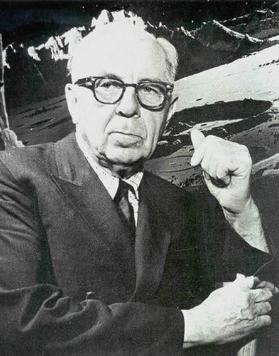
Chesley Knight Bonestell Jr. was an American painter, designer, and illustrator. His paintings inspired the American space program, and they have been influential in science fiction art and illustration. A pioneering creator of astronomical art, along with the French astronomer-artist Lucien Rudaux, Bonestell has been dubbed the "Father of Modern Space art".

Willy Otto Oskar Ley was a German and American science writer and proponent of cryptozoology. The crater Ley on the far side of the Moon is named in his honor.

Destination Moon is a 1950 American Technicolor science fiction film, independently produced by George Pal and directed by Irving Pichel, that stars John Archer, Warner Anderson, Tom Powers, and Dick Wesson. The film was distributed in the United States and the United Kingdom by Eagle-Lion Classics.
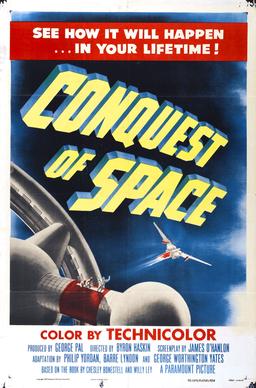
Conquest of Space is a 1955 American Technicolor science fiction film from Paramount Pictures, produced by George Pal, directed by Byron Haskin, that stars Walter Brooke, Eric Fleming, and Mickey Shaughnessy.
"Man Will Conquer Space Soon!" was the title of a series of 1950s magazine articles in Collier's detailing Wernher von Braun's plans for human spaceflight. Edited by Cornelius Ryan, the individual articles were authored by such space notables of the time as Willy Ley, Fred Lawrence Whipple, Dr. Joseph Kaplan, Dr. Heinz Haber, and von Braun. The articles were illustrated with paintings and drawings by Chesley Bonestell, Fred Freeman, and Rolf Klep, some of the finest magazine illustrators of the time.
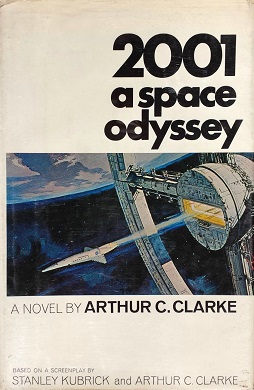
2001: A Space Odyssey is a 1968 science fiction novel by British writer Arthur C. Clarke. It was developed concurrently with Stanley Kubrick's film version and published after the release of the film. Clarke and Kubrick worked on the book together, but eventually only Clarke ended up as the official author. The story is based in part on various short stories by Clarke, including "The Sentinel". By 1992, the novel had sold three million copies worldwide. An elaboration of Clarke and Kubrick's collaborative work on this project was made in the 1972 book The Lost Worlds of 2001.
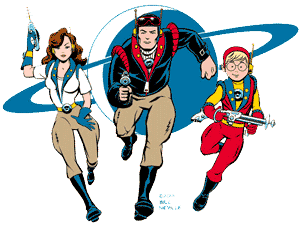
The 62nd World Science Fiction Convention (Worldcon), also known as Noreascon 4, was held on 2–6 September 2004 at the Hynes Convention Center, Sheraton Boston Hotel and Boston Marriott Copley Place in Boston, Massachusetts, United States.
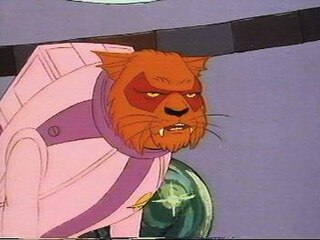
"The Slaver Weapon" is the fourteenth episode of the first season of the American animated science fiction television series Star Trek: The Animated Series. It first aired on NBC on December 15, 1973, and was written by Larry Niven. It was based on his original short story "The Soft Weapon". This episode was expanded to become the first half of a full-length novel by science-fiction author Alan Dean Foster as Star Trek Log Ten.
The International Fantasy Award was an annual literary award for the best science fiction or fantasy book and, in 1951-1953, the best non-fiction book of interest to science fiction and fantasy readers. The IFA was given by an international panel of prominent fans and professionals in 1951-1955 and then again in 1957.

Ron Miller is an American illustrator and writer who lives and works in South Boston, Virginia. He now specializes in astronomical, astronautical and science fiction books for adults and young adults.

When Worlds Collide is a 1951 American science fiction disaster film released by Paramount Pictures. It was produced by George Pal, directed by Rudolph Maté, and stars Richard Derr, Barbara Rush, Peter Hansen, and John Hoyt. The film is based on the 1933 science fiction novel of the same name, co-written by Edwin Balmer and Philip Wylie.
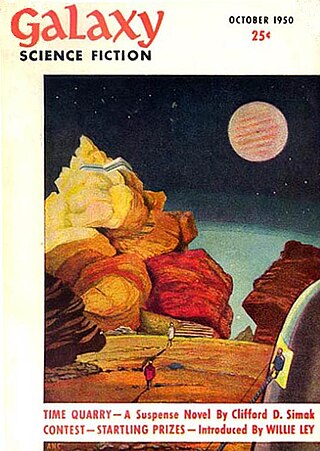
The planetary systems of stars other than the Sun and the Solar System are a staple element in many works of the science fiction genre.
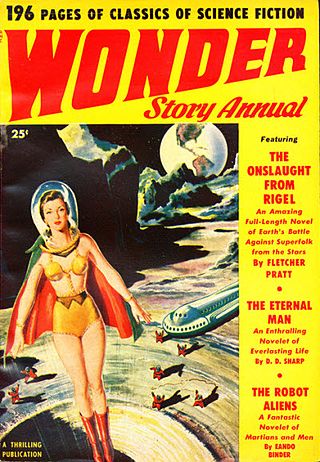
Science fiction authors have designed imaginary spacesuits for their characters almost since the beginning of fiction set in space.
The 12th World Science Fiction Convention (Worldcon), also known as SFCon, was held on 3–6 September 1954 at the Sir Francis Drake Hotel in San Francisco, California, United States.

"The Soft Weapon" is a science fiction short story by the American writer Larry Niven, set in his Known Space universe. It was first published in the February 1967 issue of If.

Sir Arthur Charles Clarke was an English science fiction writer, science writer, futurist, inventor, undersea explorer, and television series host.
The following is a list of works by Arthur C. Clarke.

Space travel, or space flight is a classic science-fiction theme that has captivated the public and is almost archetypal for science fiction. Space travel, interplanetary or interstellar, is usually performed in space ships, and spacecraft propulsion in various works ranges from the scientifically plausible to the totally fictitious.














